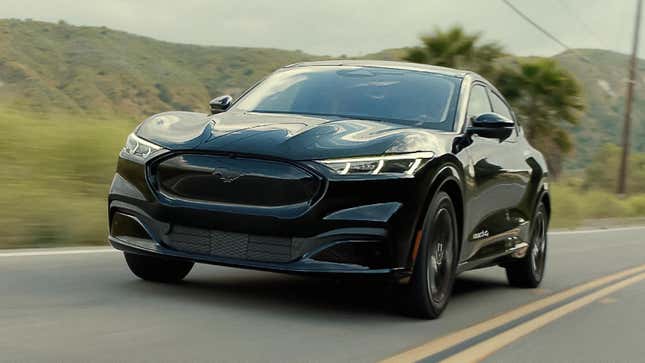
As Pennsylvania police announced double homicide charges against a woman for a fatal March DUI crash, they mentioned she was using some of the driver-assistance functions that can be found in her car, a Ford Mustang Mach-E. State and federal investigators say the woman’s crossover struck a stationary vehicle of a man who had stopped on the left shoulder of I-95 to help out a driver whose car had broken down ahead of him. The collision, which occurred around 3 a.m., killed both men.
In a statement given on September 3, Pennsylvania State Police said that the driver was using Ford’s Blue Cruise advanced safety tech, but she should have been prepared to take over control of the car regardless, according to the Associated Press. An officer said “No partially automated vehicle technology should ever be left alone to perform the driving tasks that are required to safely navigate” the roads they’re traveling on.
Investigators believe that 23-year-old pre-med student Dimple Patel was driving her Mustang at about 71 mph when the crash happened while both Blue Cruise and adaptive cruise control were engaged. She now faces multiple charges, including homicide by vehicle while driving under the influence and involuntary manslaughter, the AP reports.
A defense lawyer has argued that these deaths may actually be the fault of Ford and not Patel. He spoke with the Associated Press about his theory:
Defense lawyer Zak Goldstein said he had not yet seen the criminal complaint or any reports on the crash, and called the deaths a tragedy. However, he noted that, broadly speaking, Pennsylvania law on DUI-related homicides requires “that the DUI caused the homicide.”
“If in fact it’s a failure in a self-driving or a driving system, that may not be a homicide by DUI even if the driver is intoxicated,” he said, adding that he has not seen any case law on the issue in Pennsylvania.
Since this crash, Ford has collaborated with both the NTSB and National Highway Traffic Safety Administration. Now, NHTSA is looking into how Blue Cruise performs tasks as well as its camera-based driver monitoring system. It was at least the second time this year that a Mustang Mach-E struck a stationary vehicle at night, according to the Associated Press. Now, the National Transportation Safety Board is investigating.







